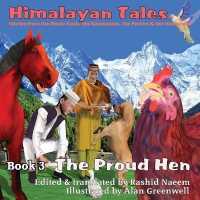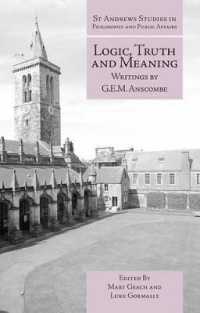- ホーム
- > 洋書
- > 英文書
- > Literary Criticism
Full Description
Scholars, librarians, students, and database vendors have all applauded the increase in access to rare, old, venerated, and obscure texts that has resulted from the rise of electronic resources. Almost everyone associated with any branch of cultural history has heard the claims about unlimited research opportunity and the rediscovery of overlooked sources. But are these claims true? Have high-tech systems and methods enhanced or inhibited scholarship? Nowhere is this question more pressing than in the area of eighteenth-century studies, where so much of the subject matter relates to the first wave of informational abundance: to that great period of profuse printing during which presses produced a mass market full of diverse readers. Textual Studies and the Enlarged Eighteenth Century probes the assumptions about the advanced tools that may be replicating this period of profusion among contemporary scholars. How much access to "period" information do current cost and present institutional support really allow? Who is accessing what—and who is not? Which authors and which topics get lost in the processor-driven shuffle? How do electronic tools bias scholarship? What are the disadvantages of databases? These and many more questions receive a brisk and robust review in this first critique of new-wave research. A variety of acclaimed scholars from an interdisciplinary array of specialties look at topics ranging from legacy bibliographical projects to standards for online editions to para-textual materials to the appropriateness of importing electronic research techniques into the study of a low-tech period and on to the transatlantic exchange of information in both the early modern and the present periods. Scholars in all fields will benefit from this vigorous analysis of the assumptions underlying the tools and the methods of twenty-first century humanities scholarship.
Contents
Introduction by Kevin L. Cope
Part I: Digital Distribution and its Discontents
"No Man but a Blockhead: What the Eighteenth Century has to Teach us about Digital Humanities" by David Hill Radcliffe
"The Plurality of Images for the Minority of Texts" by Kevin L. Cope
"Threats to Bibliographical and Textual Studies Posed by Widely Distributed Filmed and Digitized Texts" by James E. May
Part II: Profusion's Precise Market Share: Entrepreneurs, Industries, and Eccentrics
"A War of Words: Privateers, Pirates, and a Professor's Attempt to Enter the Fray; Or, Wandering in the Desert in the Land of Profusion" by Kathryn Stasio
"The Manuscript Newsletter: Its Contribution to the Evolution of the Public Sphere" by James L. Thorson and Connie Capers Thorson
"The Twenty-Years War: The Defoe Bibliography Controversy" by Kathleen "Kit" Kincade
"Power in Profusion: Collecting and Selecting Jane Austen's Letters" by Peter Sabor
Part III: The Export File: The New World
"Commonplacing the Fathers" by John P. Kaminski
"In Pursuit of Laurence Sterne in America: A Lark in the Sandbox" by W. B. Gerard
"Thomas Jefferson's 'Absent Friends'" by Tom Baughn
Afterword
"Delirious God: Text, Book, and Library in the World of Samuel Johnson" / Greg Clingham







